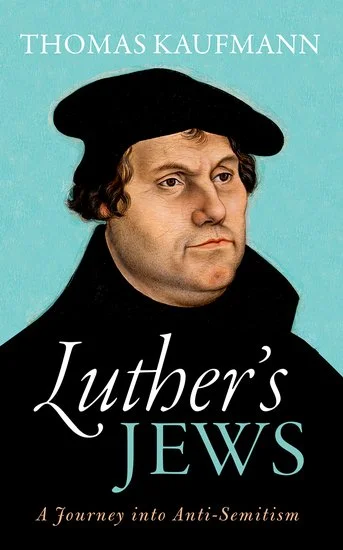Review of "Luther's Jews" by Thomas Kaufmann
Thomas Kaufmann, Luther’s Jews: A Journey into Anti-Semitism, trans. Lesley Sharpe and Jeremy Noakes (Oxford: Oxford University Press, 2017), 240 pp.
reviewed by Sarah Hinlicky Wilson
This book is very painful to read. It is also absolutely necessary.
“Luther’s attitude to the Jews, though it makes him incomprehensible, indeed unbearable, to people of our time, is very much of his time” (153). This in brief is Kaufmann’s thesis: that Luther’s anti-Judaism and premodern anti-Semitism is representative, not unique, of the sixteenth-century church—small consolation for Lutherans and Christians. At yet, at the same time, we see in Luther two polarities of thought that are so mutually opposed as to be fundamentally bewildering.
For example, Kaufmann writes, “The fact that in the early days of the Reformation Luther, by virtue of his book That Jesus Christ was born a Jew (1523), did more than anyone else in the sixteenth century to further unconditional toleration of the Jews, indeed to further religious toleration in general, is largely forgotten as a result of the image of the ageing Luther as hostile to them. But this is a mistake. No other figure from the Reformation period even approaches Luther in the depth of his inner contradictions and his ambivalent behaviour towards the Jews, for he was Janus-faced, his intellect the ‘battleground’ for two opposing eras” (4).
Kaufmann’s strategy, then, is to read Luther historically, set against what was normal in his own time and place. This book is not trying to prove a point about Luther ideologically, as pure hero or ultimate villain. Most previous studies seem to be determined either to prove Luther’s guilt or exonerate him. In this, what is to my knowledge the most thorough study of Luther’s writings and knowledge about Jews and Judaism, the results do not resolve into a straight historical arrow from past to present. “[T]he form of anti-Semitism that aimed to eliminate the Jews, to kill them systematically,” Kaufmann observes, “was completely alien to the historical Luther. It also ignores the fact that Luther directed severe criticism at the failings of the Protestant church also and feared God’s devastating wrath if their own sin was compounded by the ‘alien sin’ of the Jews. In addition, it is an inadmissible simplification of the complex genealogy of modern biology-inspired anti-Semitism to claim Luther as one of its sources, let alone a leading one… Luther’s aim was not to establish a ‘racially pure’ state, but a religiously homogenous society of Christians that did not tolerate any religious dissent” (9).
Overall, Kaufmann warns against using Luther either as an apostle of toleration or a wellspring of race theory. Chapter six on “Mixed Responses: The Reception of Luther’s Attitude to the Jews from the Sixteenth to the Twentieth Centuries,” especially the sections on Nazi use of Luther, shows just how dishonest and distorting this kind of “use” of Luther is—while acknowledging that Luther’s words lent themselves to precisely that kind of distortion. “To historicize him does not mean to justify him, to make him irrelevant, or to ‘diminish’ him… Historicizing means relativizing the boundaries, obvious to us, between ‘reality’ and ‘fictionality’ when we refer to Luther’s age, for ‘Luther’s Jews’ to us are crude and overheated phantasies, while for him they were no less ‘real’ than the Devil. Historicizing makes it possible to resist the tendency to read modern ideas into historical figures and subjects” (158).
So much for Kaufmann’s balanced and sober approach. What in fact did Luther say and think, and how did he change? One of the most disturbing and tragic facts to emerge from this study is that Luther was, academically speaking, on top of the current literature on Jews and Judaism. It’s easy to think of him as lazily indulging in commonplace Christian slander of the only religious other in Europe. Actually, Luther was as responsible as he apparently could be. The problem is that the sources he had were not. “Fake news” is not a twenty-first century phenomenon alone. Terrible reports of evil Jewish practices circulated, some even by converts from Judaism to Christianity (whose motivations in writing these reports for the public are inscrutable on many levels). Luther failed to leaven his reactions with the grace and humility he learned from the gospel—but he also genuinely thought that his savior was being insulted and defamed by a fifth column of infiltrators. It’s a double warning to us now: not only to check ourselves when we are inclined to purge from our midst blasphemers and traitors, but to be skeptical about reports making out the accused to be blasphemers at all.
Luther also, less troublingly, learned about Judaism from the emerging field of Christian Hebraic studies, and indeed himself became quite an expert on Hebrew. The common thread that animates all of his writings about the Jews is the desire to prove beyond any question of a doubt that Jesus was the promised Messiah to Israel. Despite its enormously greater size and power, the church has evidently never gotten over the anxiety that some Jews could hold out against its fundamental confession, and Luther was no exception. Whether he was personally favorable or hostile to Jews at any point in his career—and the fact is that he knew virtually no Jews firsthand—this theological concern remains paramount from beginning to end.
A final and odd fact is that it appears that Luther had some reason to believe that the papists had hired a Jewish assassin to kill him (37–38). This could only have contributed to his paranoia, with devastating consequences.
One of the stranger ironies of history is that, because of his early treatise That Jesus Christ was born a Jew, Luther initially enjoyed a warm reception among European Jews. He did not repeat the usual calumnies against them (about poisoning wells, murdering babies, and so forth) and indeed advocated toleration for the Jews for virtually the first time in church history. A nineteenth-century Jewish scholar, Heinrich Graetz, said of this treatise, “These were words of a kind that Jews had not heard for a thousand years” (135). The Jews saw in him the swallow announcing the onset of spring—a huge societal change in the making that would ease their perpetually tense situation. They sent him notes of thanks and even gifts. It was an unintended consequence of Luther’s devastating criticisms of the church—of his church, of Christians—that he implied that Jews could not be scapegoated alone for problems. Christians themselves had to bear much or even most of the blame.
It’s probably hard for us, in such a radically different political situation, with long practice (even if still not perfect) of religious toleration, to fathom how far Luther was stretching beyond convention and precedent in his early advocacy for the Jews. Even amidst all his other risky offerings, it stands out. He stayed the course with many of his other startling proposals, but this one appeared to be too much for him, not least of all because his hope that it would convert the Jews failed. But it is almost impossible for us to really grasp how alien the whole idea of toleration was to Luther and his world, and easy for us to fault him for his failures at what to us is second nature.
Yet, Kaufmann argues, the one distinctive thing Luther says about the Jews—the one real break from all preceding medieval Christian literature—was in fact his call to tolerate them and live together with them (66). Yes, this same Luther who later advocated burning down their synagogues and chasing them out of town like wild dogs! It became one of the major points of criticism of Luther from his Roman opponents: he only confirmed the Jews in their hard-headedness and made them uppity. Lutheranism, at the outset, was culpably “Jew-friendly.”
The shift in his attitude was caused by a lot of things: dissent within the Reformation itself, splinter groups trying to reimpose Mosaic law on Christians, condemnation and threat of death from the Roman authorities, wars and rumors of wars, illness, misinformation about the spread of “sabbatarianism,” and the death of his daughter. Luther was largely silent about the Jews from a Psalm commentary in 1526 until his nasty treatise Against the Sabbatarians in 1539.
But perhaps the most painful factor of all in his change was the double-edged sword of his reclamation of the Old Testament from general Christian neglect and disdain. On the one hand, such study could have opened Luther and his colleagues up to the fundamentally Jewish roots of Christianity; but in practice, it seems, “the more ‘Christian,’ familiar, and ‘their own’ the Old Testament became, the more incomprehensible the refusal of the Jews to accept the only possible religious conclusion, namely conversion, inevitably appeared” (72). Luther the exegete, who wanted to confirm New Testament faith in Jesus the Messiah, could not abide any other reading of those Hebrew texts. As a matter of fact, it turns out that the target of Luther’s late and terrible On the Jews and Their Lies was not only Jews—it was just as much, if not more so, Christian scholars of Hebrew and rabbinic texts who were unable to mount a sufficient case for the Christian faith against Jewish denials!
In terms of the reception of Luther’s thought in his time and the succeeding centuries, many of his colleagues more or less endorsed his views, though some were even more aggressive (Bucer) and some reviled his views entirely (Bullinger). On the Jews and Their Lies was one of Luther’s least successful sales, but possibly only because he wasn’t saying much that people didn’t already think. Thankfully, the political authorities tended to ignore his suggestions—but again, not for the reasons we might like: they gained a great deal from the Jews paying them protection money and were not keen to lose their income. Overall, there were no significant differences in the treatment of the Jews in Lutheran, Reformed, and Catholic territories for a long time to come.
The question that arises for us is: does Luther’s invective against the Jews reveal the ultimate rotten core of his theology, or is it the ultimate betrayal of his theology? Kaufmann makes no apologies or excuses for Luther’s terrible words, even when setting them in their historical context, but his final judgment is unequivocal: “In the case of the Jews, Luther, though a theologian of the Word, completely lost confidence in the power of God in His Word—a declaration of theological bankruptcy” (115).
Christian believers who have come to understand and believe the gospel better as a result of Luther’s theology therefore have to make a definitive separation within the reformer’s legacy. What he said and encouraged against the Jews has to be rejected, publicly and decisively, for being wicked in and of itself, but equally as a fundamental betrayal of the only thing valuable about his teaching. Otherwise we cannot be Lutherans at all. Indeed, unless the whole Christian church confesses and excises our historic anti-Judaism, we cannot be Christians at all. God grant us the strength and courage to face the worst of our past, and the purifying Spirit to do better in the future.




